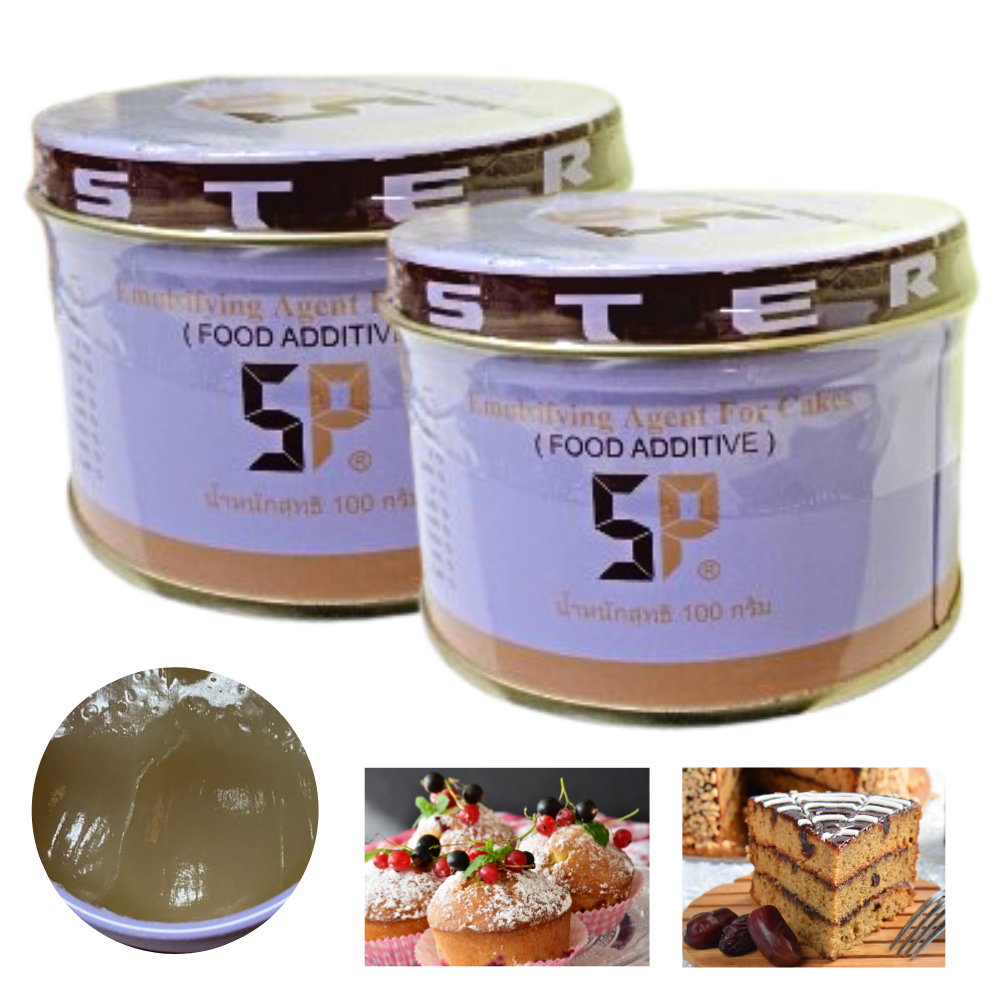Emulsifier In Food Truth vs. Fiction You Should Know
Wiki Article
Everything about the Duty of an Emulsifier in Food and Its Value in Modern Food
Emulsifiers are critical in modern food, assisting in the mix of immiscible fluids like oil and water. Their capability to support mixes enhances the appearance and flavor of various food items. From salad dressings to baked products, emulsifiers play a substantial role in both business and home cooking. The science behind their feature and the future developments in their use continue to be much less explored. What extra could be uncovered about these crucial culinary representatives?Comprehending Emulsification: The Scientific Research Behind the Process
Although emulsification might appear like a basic culinary technique, it entails intricate scientific concepts that are essential for creating steady mixtures of immiscible fluids, such as oil and water. At the heart of this procedure exists the principle of surface area tension, which avoids both liquids from blending naturally. Emulsifiers, compounds that minimize surface area stress, play a crucial role in helping with the combination of these fluids. They possess both hydrophilic (water-attracting) and hydrophobic (water-repelling) buildings, enabling them to anchor themselves at the user interface between oil and water.When an emulsifier is presented and the blend is perturbed, it develops a protective obstacle around distributed beads of one fluid within the other, stabilizing the mix. This activity not only enhances texture and mouthfeel in food products however additionally adds to their aesthetic appeal. Emulsifier In Food. Understanding the science behind emulsification is essential in contemporary cuisine, enabling cooks to produce a variety of sauces, dressings, and emulsified dishes
Usual Kinds of Emulsifiers Made Use Of in Food
Emulsifiers are essential components in the food sector, playing a crucial function in stabilizing mixtures of oil and water. Numerous sorts of emulsifiers are generally used, each with one-of-a-kind residential properties suited for different applications. Lecithin, derived from soybeans or egg yolks, is among the most popular natural emulsifiers, usually discovered in delicious chocolates and dressings. Mono- and diglycerides, which are derived from glycerol and fats, are commonly used in baked items and margarine to enhance texture and extend service life. Another usual emulsifier is polysorbate 80, favored for its capability to enhance the consistency of ice lotions and sauces. Furthermore, xanthan periodontal and guar gum function as thickening agents that also add to emulsification in gluten-free items. These emulsifiers are indispensable to producing a stable, palatable item in modern food solutions, guaranteeing a pleasurable sensory experience for consumers.
The Function of Emulsifiers in Different Food Products
A variety of food products count on emulsifiers to attain desired textures and stability. These substances facilitate the mixing of immiscible fluids, such as oil and water, which is vital in many processed foods. In salad dressings, emulsifiers help maintain a constant combination, stopping separation and enhancing rack life. In baked products, they add to a consistent crumb structure and wetness retention, boosting overall top quality.Emulsifiers also play a substantial role in milk items, such as ice lotion and yogurt, where they support fat blobs, ensuring a smooth mouthfeel. Additionally, in sauces and condiments, they enhance thickness and enhance spreadability. This functionality is important in the manufacturing of delicious chocolates, margarine, and mayonnaise, where a cohesive item is essential. Overall, using emulsifiers in numerous foodstuff is integral to modern food production, enhancing security and uniformity throughout a wide variety of products.
How Emulsifiers Enhance Appearance and Taste

When included into food, emulsifiers greatly improve both structure and taste, developing a more delightful consuming experience. These materials help with the blending of ingredients that generally do not mix well, such as oil and water, resulting in a smoother, creamier consistency. This not just improves mouthfeel however also enables flavors to disperse uniformly throughout the item, have a peek at this site amplifying the overall preference.

Emulsifiers in Home Food Preparation: Tips and Techniques
Exactly how can home chefs successfully use emulsifiers to enhance their meals? Emulsifiers play a vital role in accomplishing preferable appearances and flavors in homemade recipes. For circumstances, utilizing egg yolks in mayo or hollandaise sauce permits for a secure emulsion, incorporating oil and water successfully. Home cooks can also experiment with mustard, which acts as an emulsifier in vinaigrettes, ensuring a smooth consistency.In cooking, incorporating lecithin, found in egg yolks or soy, can improve dough stability and dampness retention. Furthermore, utilizing business emulsifiers like xanthan gum or guar periodontal can aid enlarge sauces and dressings while keeping a velvety mouthfeel.
When creating ice creams or whipped garnishes, emulsifiers can stop ice crystal development, causing a smoother texture. By understanding these techniques, home cooks can significantly elevate their cooking developments, offering consistent and enjoyable dishes that display the power of emulsification.
The Future of Emulsifiers in Culinary Development
As the culinary globe remains to develop, the function of emulsifiers is positioned to end up being progressively innovative and diverse. Breakthroughs in food scientific research are causing the development of new emulsifying agents stemmed from all-natural resources, which satisfy health-conscious consumers and improve the sensory top qualities of recipes. Technologies such as plant-based emulsifiers are gaining traction, permitting cooks to produce vegan and allergen-free options without compromising structure or flavor.Additionally, making use of emulsifiers in molecular gastronomy is increasing, enabling chefs to try out special structures and presentations that mesmerize restaurants. As sustainability ends up being a priority, the future might see a change in the direction of green emulsifiers that reduce ecological impact.
Eventually, emulsifiers will certainly remain to play an essential duty in cooking development, bridging the space between practice and modernity, and enabling cooks to push the borders of creative thinking in their cooking areas.
Frequently Asked Concerns

Are Emulsifiers Safe for Individuals With Allergic reactions?
Emulsifiers can be risk-free for people with allergic reactions, relying on their particular level of sensitivities. Nonetheless, particular emulsifiers, stemmed from allergenic sources like soy or eggs, might set off reactions, requiring careful component examination and appointment with medical care professionals.Exactly How Do Emulsifiers Influence Food Service Life?
Emulsifiers boost food life span by supporting blends, protecting against splitting up, and decreasing microbial growth. This stability helps maintain texture and flavor in time, enabling why not try these out products to remain enticing and risk-free for intake longer than without emulsifiers.Can Emulsifiers Be Derived From Natural Sources?
Yes, emulsifiers can be stemmed from natural sources such as plants, eggs, and milk items (Emulsifier In Food). These natural emulsifiers help maintain combinations, enhancing texture and consistency in various food applications while being favored for health-conscious customersWhat Are the Environmental Effects of Emulsifier Production?
The ecological effects of emulsifier production include source exhaustion, environment devastation, and air pollution from artificial processes. All-natural emulsifier sourcing can reduce some results, yet overall, commercial methods still pose significant ecological challenges to ecological communities worldwide.

Are There Vegan Emulsifiers Available out there?
Yes, there are a number of vegan emulsifiers readily available out there, such as lecithin originated from soy or visit the site sunflower, guar gum, and xanthan gum. These alternatives accommodate plant-based diets without jeopardizing emulsifying buildings.Emulsifiers are important active ingredients in the food market, playing an important duty in supporting blends of oil and water. A range of food products depend on emulsifiers to accomplish desired structures and security. When incorporated right into food items, emulsifiers considerably improve both structure and flavor, producing a more pleasurable eating experience. Additionally, emulsifiers can stabilize air pockets in whipped items like mousses and lotions, leading to a light and ventilated structure. Emulsifiers enhance food shelf life by stabilizing mixtures, protecting against separation, and lowering microbial development.
Report this wiki page